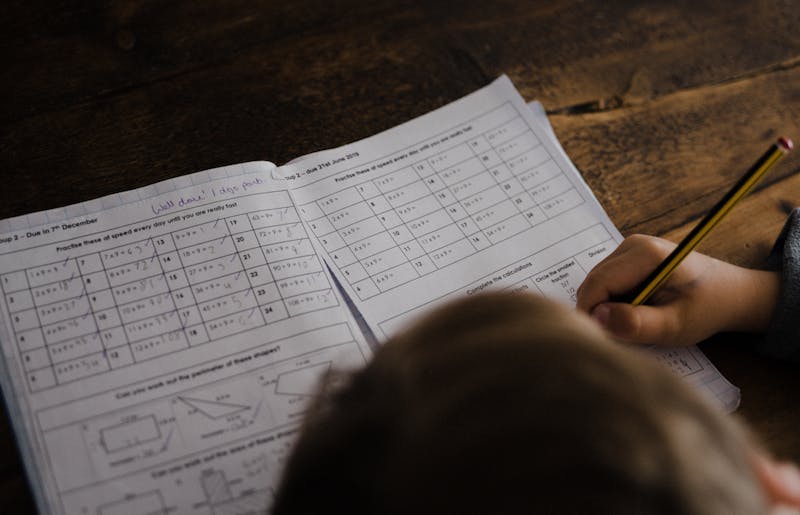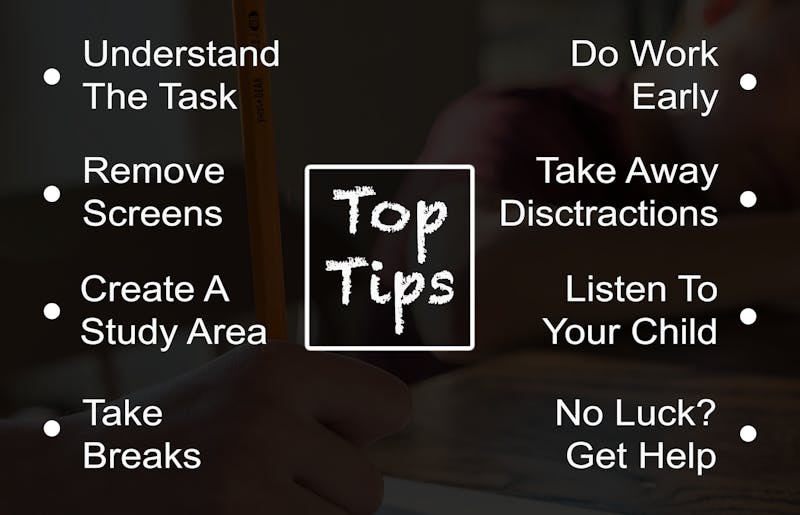Homework Tips For The Busy Parent
 By
Casey Wise
By
Casey Wise

Homework is rarely fun for anyone, not the student who's already been at school all day or the parent/guardian who's been juggling adult life since waking up. With this in mind, getting some extra study done shouldn't be a chore, and there are ways to make the process less painful. Everyone's living situation is different, as is everyone's learning approach, but there are some universal truths regarding communication and concentration.
With a little planning and thought, homework can seamlessly be introduced to a family schedule and reinforce the host of benefits that working independently can bring. With the wrong approach, homework can be a curse word to a child, but when approached properly, it can be a great way to strengthen household bonds and impart some knowledge an adult has picked up along the way. There's never one best solution, so we've collected a mix below to help the busy parents out there. Implement a few of these, and we promise your life will get a whole lot easier.
Take The Time To Understand The Task At Hand (You Too!)
Rushing into anything is always a bad idea, and homework is no different. We can all remember that feeling of being overwhelmed with a stack of work we didn't quite understand - especially if we were already struggling in class! Before any homework is attempted, sit down with your child and spend a few minutes going over the task at hand, ask what the teacher is teaching, and have a look through any resources they may have brought home. This shows that you care, are paying attention, and together you can create an action plan on how you're going to attack the work. As the old saying goes, “Eat the elephant one bite at a time.”
Goodbye Screens
An obvious one here, but remove all distractions and all screens - in less, of course, the work is online-based. Kids have never had it harder when it comes to distractions and the erosion of our sense of concentration. Nowadays, both children and adults could do with prepping time away from our blinking, flashing, and pinging devices.
A sense of calm increases focus and is also great for our overall health. When you're not worrying about your latest notification or email, it's surprising what can be achieved. Sit up straight and follow some of these handy tips to get the most out of the study experience.
Dedicated Study Areas
Leading on from our last point, this simple suggestion is arguably the easiest and most crucial one to follow - create a dedicated study area. Those of us who use computers for work have desks, specially designed chairs, and office equipment, and kids should be given the same consideration. Expecting them to study in the living room while the rest of the house watches TV or perhaps crouched over their beds is not fair nor productive.
A dedicated quiet area with proper desk space and comfortable seating will reinforce that this area is for study and has a distinct purpose. It's a good tip we take into adulthood, too, the distinction between 'leisure spaces' and 'workspaces.'
Take Breaks To Maintain Interest
When we think about homework and studying in general, we often neglect the importance of taking regular breaks. In 2011, the University of Illinois conducted an experiment to see whether a group of students who took breaks outperformed those who didn't. The study found that the performance of those who didn't take regular breaks began to decline over the 50 minute test time, while. The rested group was sharp and on-task for the entire duration. Taking time to step away from work dramatically increases the quality of students' work and keeps them engaged and interested in what they're doing.
Take The Pressure Off & Do It Early
The stress of studying is something that can start in children and spread throughout the family. As a parent, the last thing you want is for your child to get worked up about an upcoming exam or project, and cram everything at the last minute. Doing work early, perhaps even a week or two in advance, allows your children to truly grasp what they're being taught, as well as avoiding the stress of last-minute crunching. Try sitting down with your children the day they get notified of the work that's needed, and start then and there, wasting no time and causing far less stress.
Keep Distractions To A Minimum
Procrastination is the death of productivity, and whether you are 13 or 53, it's a tough beast to tackle. Procrastinating over a long period of time can cause demotivation and disillusion with work and can even lead to depression. The best way to minimize the temptation to procrastinate is to get rid of all possible distractions. For your children, this may be a games console, cell phone, or sports activity (just to name a few). Communicate with your child, and see what distracts them the most, and also take into account your own distractions to mirror this progression in education.
Listen And Learn
As children grow, the way they express themselves changes, and for most, becomes easier to understand. However, while they're still learning, navigating their minds, and understanding their complaints and issues can prove tricky. Knowing what support your child needs is most of the battle when it comes to studying, so sit down with them, listen to them, and offer different approaches to the learning experience. Making eye contact, giving your full attention, and repeating what's said are some of the crucial elements of an active listener, a skill that all parents should have.
Get Help
If you've tried all the suggestions in this article, and nothing seems to work, then you might want to think about getting some help. By attacking some of the more specific issues your child has with learning, tutors, chaplains, and even psychiatrists can play a huge role in the progression of your child's education. Tutors are usually the first step towards improving and refining knowledge in a particular subject, and will often inform you as a parent about more serious problems at hand. Don't be afraid to ask for help; we all need support, and your child's education is no different.
Resources:
-
Why is homework important?
https://www.acornhouse.school/2019/12/18/why-is-homework-important -
The Value of Parents Helping with Homework
https://www.teachhub.com/professional-development/2020/09/the-value-of-parents-helping-with-homework -
How Phones Ruin Concentration
https://childmind.org/article/kids-shouldnt-use-phones-during-homework -
Ten Ways to Find a Sense of Calm While Studying
https://www.dummies.com/education/math/ten-ways-to-find-a-sense-of-calm-while-studying -
Why last minute studying is bad
https://tutorcruncher.com/crm/exam-tutoring -
Stress: Evaluation of the concept
https://www.sciencedirect.com/science/article/abs/pii/S0149763411000224#fig0015 -
The science of taking a break
https://www.onlineschools.org/science-of-study-breaks -
Active listening with children
https://www.cdc.gov/parents/essentials/communication/activelistening.html -
The problems with procrastination
https://www.mindtools.com/pages/article/newHTE_96.htm -
Benefits of Tutoring
https://www.oxfordlearning.com/benefits-of-tutoring
About the Author

Casey Wise
Casey Wise is a British journalist, creative copywriter, and music creator with a deep passion for language, travel, and technology. Based in Barcelona, his work extends from local start-ups and newspapers to university radio and the British NHS.
Recent Clues
- *Every cloud has a silver ___, idiom that emphasizes advantages in a difficult situation Crossword Clue
- Pasture cry Crossword Clue
- Feel kind of large animal Crossword Clue
- Big name in vacuum cleaners Crossword Clue
- Stormy petrels eating unknown snacks Crossword Clue
- Notion of time still coming first Crossword Clue
- Quickly read through demands for sportswear (3,5) Crossword Clue
- Beat the Parisian in the lead, lapping gutless runner (6) Crossword Clue
- See 24 Down Crossword Clue
- UFO's occupants: Abbr. Crossword Clue
- Pop the question Crossword Clue
- Agony Crossword Clue
- Town in Orne, France; an early lace manufacturing centre Crossword Clue
- Naked Crossword Clue
- Struggle to get iron into thin sheet Crossword Clue
- Of the kidneys Crossword Clue
- Raw material from forest Crossword Clue
- Run on the level Crossword Clue
- A game revolutionary with support for Communist works Crossword Clue
- Italian who drew one game, then another (7) Crossword Clue
- Glossy, shiny Crossword Clue
- Fork prong that rhymes with "mine" Crossword Clue
- So sire can't have any bright individuals in school? Crossword Clue
- Electoral district Crossword Clue
- Limited cricket format Crossword Clue
- Of course, you're welcome! Crossword Clue
- Bird's sleeping location Crossword Clue
- Song syllable after "Fa" Crossword Clue
- The ____, quiz show featuring "The Governess" and "The Sinnerman" Crossword Clue
- Horses Crossword Clue
- In proportion Crossword Clue
- E.g. Turkey's swimming team with inspiring energy (5,4) Crossword Clue
- Outlaw to steal from home with US gangster Crossword Clue
- Insect in the genus Cicindela * Crossword Clue
- Behaved Crossword Clue
- Overjoyed Crossword Clue
- Weight-lifter caught drug smuggling legged it (5) Crossword Clue
- Arrange (an exhibition) (6) Crossword Clue
- Criminal in bog holding either side of loo (5) Crossword Clue
- & 22A Best Actor in a Leading Role Oscar winner for Network (5,5) Crossword Clue
- Unfruitful show of hesitation entering steps in wall (7) Crossword Clue
- He's on the staff Crossword Clue
- Worst and best features of races (3,5) Crossword Clue
- Nursery's last howler damaged pot culture Crossword Clue
- Money (or time) spent (6) Crossword Clue
- Took a chair Crossword Clue
- Dammit! Crossword Clue
- City in Ohio, US, known in the early 20th-century as the rubber capital of the world Crossword Clue
- Allege Crossword Clue
- Head off (9) Crossword Clue
Trending Clues
- Tabloid partner of Affleck Crossword Clue
- Flemish painter Peter Paul __ Crossword Clue
- Sister of Castor and Pollux Crossword Clue
- Nice companion Crossword Clue
- Outline Crossword Clue
- First Hebrew letter Crossword Clue
- Light melody Crossword Clue
- Musical with the song "Changing My Major" Crossword Clue
- Nymph of myth Crossword Clue
- Giga, tera, peta, ___ Crossword Clue
- Meat mass Crossword Clue
- "Margaret won't be in the comedy showcase!"? Crossword Clue
- "Way cool!" Crossword Clue
- 2024 event Crossword Clue
- ___ Lakshmi, longtime host of "Top Chef" Crossword Clue
- "Serious situation developing here!" Crossword Clue
- University of South Dakota athlete Crossword Clue
- Visit briefly Crossword Clue
- Melville character with the mantra "I would prefer not to" Crossword Clue
- Mythical lion's home Crossword Clue
- Just barely make it through Crossword Clue
- Tables and chairs that wobble? Crossword Clue
- Utterly pompous Crossword Clue
- Bridge forerunner Crossword Clue
- Queen or king, but not ace Crossword Clue
- Kilt pattern Crossword Clue
- "Straight up, please," to match 17-, 25-, 37-, and 51-Across? Crossword Clue
- Site of track events for 3-Down Crossword Clue
- Highly praises Crossword Clue
- Kudos to an Olympic boxer? Crossword Clue
- Western Conference WNBA team: 2 wds. Crossword Clue
- "The Hairy Ape" writer Crossword Clue
- Explain to death Crossword Clue
- "You can't see it, it's ____! Boogie woogie woogie!" Crossword Clue
- Make lumber out of Crossword Clue
- Rhyming subject for an English major Crossword Clue
- Reptiles in the logos of some dojos Crossword Clue
- Singer Del Rey Crossword Clue
- White flower named for the fact that it appears to float Crossword Clue
- Neuters Crossword Clue
- "Goose eggs" Crossword Clue
- Meanders Crossword Clue
- __ of the woods mushroom Crossword Clue
- Kudos to an Olympic weightlifter? Crossword Clue
- Beginning of a famous boast Crossword Clue
- Q-Tip and Ice-T Crossword Clue
- Exclamation when a product lives up to the hype? Crossword Clue
- Orientation for new senators? Crossword Clue
- Best-selling author of 2017's "The Hate U Give" Crossword Clue
- Permafrost predators Crossword Clue

